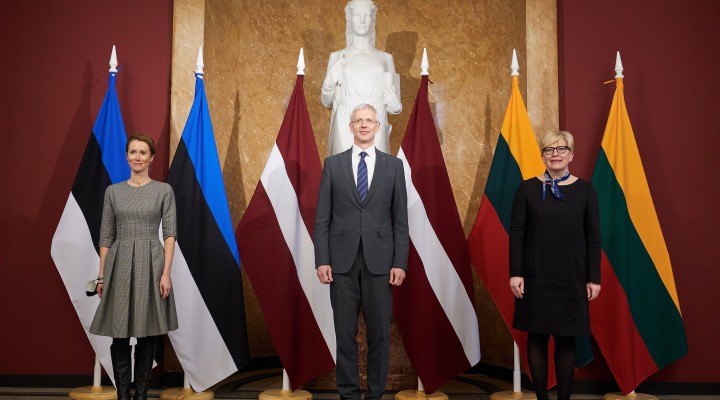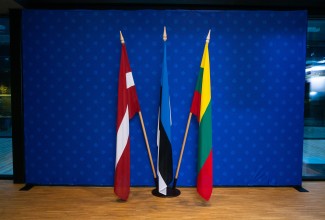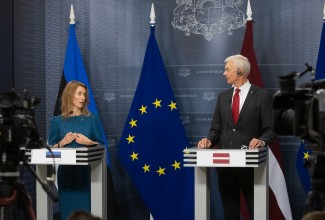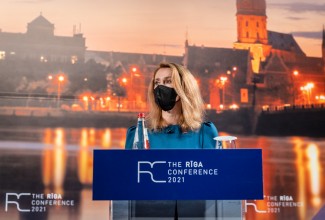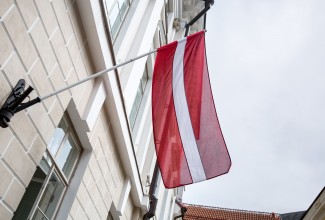“These are very tense times. The security situation is the most difficult it has been in 30 years. Russia is not only threatening Ukraine with the use of military force; ultimate demands are being made on the basic premises of the security of all of us,” said Kaja Kallas after the meeting. “The messages of Russia show that the goals of our defence policy so far are justified. We have been constantly talking about strengthening the deterrent attitude of the east wing of NATO. I am happy about the decision of the United States to send additional troops to Europe. We are also grateful to the United Kingdom for announcing its decision to increase its presence in our region. Several allies have announced their greater contribution to the east wing of NATO,” said Kallas.
The prime ministers of the Baltic states reaffirmed their support for Ukraine and welcomed the decision of the European Union to provide 1.2 billion euros in economic aid to Ukraine. In response to the request from Kiev, the Baltic states are also sending military assistance to Ukraine. If Russia chooses to escalate, Estonia, Latvia, and Lithuania will support strong European sanctions.
Kaja Kallas introduced to her colleagues the decision of the Estonian government adopted on 3 February to impose an additional state sanction on mineral oils originating in Belarus, i.e. commodity group 2707. The prime ministers reaffirmed that if there are gaps in the sanctions regime, they must also be filled at the EU level.
It was stated at the meeting that close cooperation and effective connections with neighbours will help ensure energy security in the region. “Currently, there is security of electricity and gas supply in the Baltics. Sufficient reserves as well as new connections are important, and the gas pipeline to be completed this year between Lithuania and Poland should ensure the security of gas supply. We are moving forward with the synchronisation of electricity networks in Central Europe. I am happy to say that everything is going according to the plan. The recent decision to allocate 170 million euros from the Connecting Europe Facility to the project will help to complete its final phase. All this is important to ensure the security of supply, but also to ensure that our people can use gas and electricity at a reasonable price,” confirmed Kallas.
According to the Estonian prime minister, renewable energy capacities ensure a reasonable price. “We are successfully developing offshore wind farms together with Latvia, and there are other ways to prevent price shocks as well. It is also important to develop a network of offshore wind farms at the level of the European Union, which would enable the electricity produced there to be used on all shores of the Baltic Sea. This electricity is much cheaper,” emphasised Kaja Kallas.
The need for rapid investment in renewable energy capacities has also been emphasised in the common position of the Baltic States signed at the meeting to negotiate the “Fit for 55” proposals in the European Union.
In addition to investing in energy infrastructure, it is particularly important for Estonia, Latvia, and Lithuania to ensure predictable CO2 prices, set more realistic targets for capturing greenhouse gas emissions from land use and forestry, and to create the conditions for emission reductions in the transport, buildings, and agriculture sectors to be as smooth and affordable as possible for all member states. We also consider it important to maintain a level playing field in the maritime sector of the European Union, which is particularly important for Baltic ports and companies in the vicinity of third countries where environmental ambition is not as high. “The goal of the green transition is to achieve sustainable economic growth in a way that respects natural boundaries. Our people, our businesses, and our environment must be protected. We must also ensure that the goals set are realistic. I am glad that we have common positions to defend together at the European level,” said Kallas.
The prime ministers also discussed the fight against the coronavirus and agreed that, despite the specificities of each country, the ministers of health would need to coordinate even more to work towards uniform rules in the future that would make things easier for passengers and businesses.
Common positions of Estonia, Latvia and Lithuania regarding the “Fit for 55” legislative package: https://www.valitsus.ee/media/4381/download
